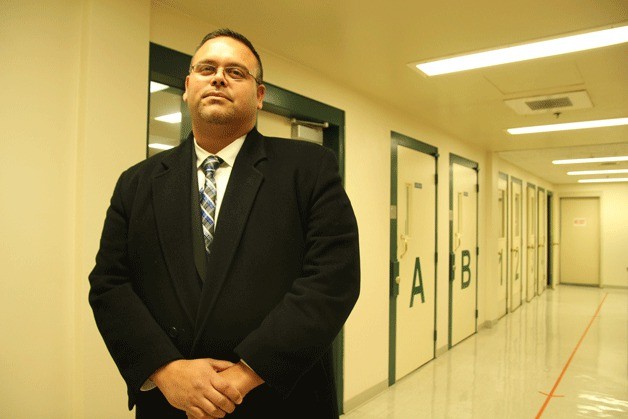Jose Briones plans to bring what he’s learned about dealing with mentally ill inmates at the state’s second-largest prison to the Island County jail.
Island County Sheriff Mark Brown recently named Briones as the new jail chief. He replaces De Dennis, who retired this summer after being suspended in the wake of a mentally ill inmate’s death from dehydration.
Briones begins work on Dec. 7.
Briones has an obvious passion for his job and a very modern approach to corrections. He said he would like to help make the county jail a model for jails across the state.
Gone are the days when jails and prisons should simply warehouse criminals or stick difficult inmates in solitary confinement for long periods, he said. Instead, he talks about the importance of compassion and the need to implement evidence-based programs and affect “positive offender change.”
“I see this as a great opportunity to get involved with a jail that’s looking to make positive changes,” he said. “It’s an opportunity to bring some of what we’ve learned at state correctional facilities to a county jail.”
Briones started out as a corrections officer in 2002 and worked his way up the leadership at the Monroe Correctional Complex to become the captain of the Special Offenders and Intensive Management Group.
The 400-bed unit houses prisoners with serious mental illnesses who are considered the most difficult to manage. The unit is so successful that a top official from the U.S. Justice Department recently visited to possibly replicate the system in the federal prisons.
Briones’ expertise with mentally ill inmates, Brown said, is part of the reason he chose him to lead the 58-bed county jail.
Brown and his administration have focused on implementing reforms at the jail, especially in the approach to inmates with mental health problems, since 25-year-old Keaton Farris died in a cell April 7.
Farris was in the midst of a mental-health crisis but didn’t receive any help, even though a jail nurse and a mental-health professional from Western State Hospital saw him. Jail staff turned off the water to his cell after he flooded it. Corrections deputies didn’t check on him and find his body for several hours, according to the investigative report on the death.
Briones read the report and opined that “the Swiss cheese effect” led to the tragedy. There wasn’t “a gaping hole in the wall,” he said, but a series of errors, oversights and procedural problems.
He also studied the jail expert’s report on the jail, which outlines a series of proposed reforms — many of which were already implemented under interim jail chief Chris Garden.
“For the record, I am extremely proud of the hard work done by our jail staff under the direction of interim chief Chris Garden during the past several months,” Brown said. “I have full confidence that Jose will be able to build on this successful transition as he embarks on his new job.”
In the prison system, much of Briones’ focus was on decreasing violence and finding ways to help prisoners succeed after they are released.
It’s a public safety issue, he said. Between 75 to 85 percent of incarcerated people will get out; reducing recidivism in the prison population means less crime and safer streets.
It’s also a cost effective approach, he argues.
“I would rather pay a little bit more now than a lot more later,” he said.
The best path, Briones said, is to follow evidence-based programs and procedures — things that have been studied and shown to be effective. Encouraging inmates, for example, to get involved with family or support groups while they are incarcerated helps them to readjust more easily after release, he said.
Many of these ideas can be brought to the jail, he said.
“Re-entry starts immediately when they come into our facility,” he said.
“I know we can have a positive impact on people.”




